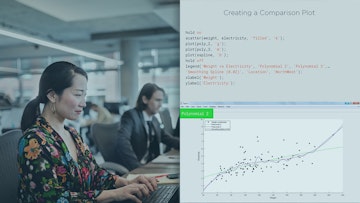

Performing Statistical Analysis with MATLAB

MATLAB has many different uses for different types of statistical analysis. In this course, Performing Statistical Analysis with MATLAB, you’ll gain the ability to analyze and model standard datasets. First, you’ll explore summary statistics. Next, you’ll...
Read more
Good to know
Save this course
Career center
Data Analyst
Statistician
Quantitative Analyst
Data Scientist
Machine Learning Engineer
Biostatistician
Actuary
Market Researcher
Operations Research Analyst
Quality Control Engineer
Risk Manager
Software Engineer
Data Visualization Specialist
Financial Analyst
Business Analyst
Reading list
Share
Similar courses
OpenCourser helps millions of learners each year. People visit us to learn workspace skills, ace their exams, and nurture their curiosity.
Our extensive catalog contains over 50,000 courses and twice as many books. Browse by search, by topic, or even by career interests. We'll match you to the right resources quickly.
Find this site helpful? Tell a friend about us.
We're supported by our community of learners. When you purchase or subscribe to courses and programs or purchase books, we may earn a commission from our partners.
Your purchases help us maintain our catalog and keep our servers humming without ads.
Thank you for supporting OpenCourser.

